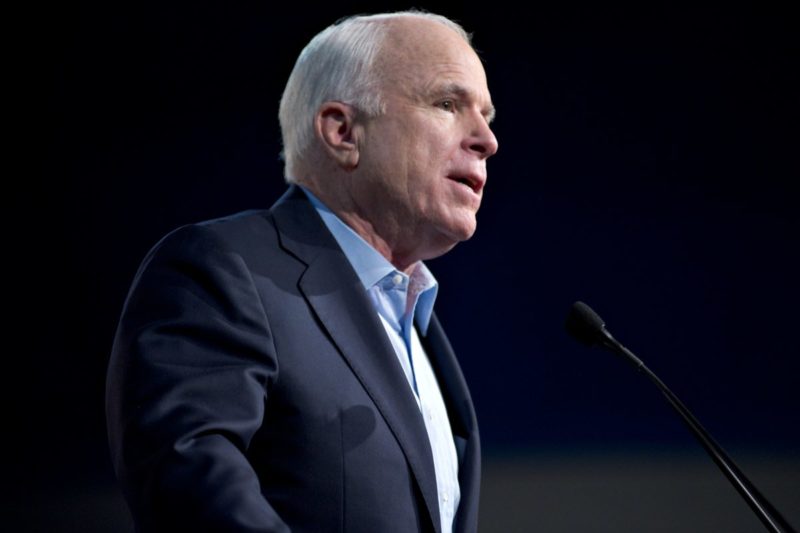Republicans Go Forward With ‘Devastating’ Attack on Obamacare’s Health-Care Gains
"Those leading the Affordable Care Act repeal continue to disregard the health and dignity of those who would be most impacted by losing health coverage and benefits."

Republicans in the U.S. Senate narrowly voted on Tuesday to repeal the health-care law under which millions of vulnerable and low-income people have gained coverage, as protesters outside the Senate chambers erupted in chants of, “Kill the bill, don’t kill us!” and “Shame!”
The vote means Senate Republicans can open debate on legislation to gut the Affordable Care Act (ACA), or Obamacare, although the public resoundingly prefers it to various Republican alternatives that would take away health-care coverage from tens of millions.
Two Republicans, Sens. Susan Collins (ME) and Lisa Murkwoski (AK), joined 48 Democrats and Independents in casting “no” votes. Vice President Mike Pence, a prime champion of defunding Planned Parenthood since his days in Congress, broke the 50-50 tie.
Political observers noted the irony of Sen. John McCain (R-AZ), who was recently diagnosed with brain cancer, flying from Arizona to cast a vote to deny health care to millions of people in the United States.
The contours of the Republican replacement plan remained a mystery before the vote. Senators said they had no idea what was in the legislation. At least four plans have floated around the halls of Congress. Estimates suggest the House-passed American Health Care Act would leave upwards of 50 million Americans without coverage by 2026, while a Senate repeal-only measure would leave almost 60 million uninsured.
“In all of its various forms, this bill is the worst bill for women in a generation,” Dawn Laguens, executive vice president of Planned Parenthood Federation of America, said in a statement. “From ending maternity coverage and the birth control benefit for millions to blocking women’s access to preventive care at Planned Parenthood, every version of Trumpcare has been devastating to women.”
“Kill the bill, don’t kill us!” #healthcare #SaveTheACA #resist #WashingtonDC pic.twitter.com/e80Z8caGZK
— Lauryn Gutierrez (@GutzyLo) July 25, 2017
Any GOP-backed plan is expected to make harsh cuts to Medicaid, restrict private insurance coverage of abortion care, drop essential health benefits—including the requirement that insurers cover birth control without a co-pay—and attempt to defund Planned Parenthood.
Defunding Planned Parenthood, however, likely amounts to little more than political grandstanding at this juncture because the Senate parliamentarian said the action would require 60 votes.
Any GOP plan would serve as a major blow to low-income communities and people of color. Under the ACA, millions who historically couldn’t afford insurance gained coverage. Beginning in 2013, when the first ACA provisions kicked in, the uninsured rate dropped 11.7 percent among Hispanic people, 8.5 percent among Black people, and 8 percent among Asian people, according to the Kaiser Family Foundation.
“Black women in the United States are between three and four times more likely to die from pregnancy-related causes than White women, and we are one of the few countries in the world where maternal mortality is actually getting worse,” Monica Simpson, executive director of SisterSong, said in a statement. “What Black women certainly don’t need are more politically-motivated attacks on our health coverage.”
Republicans reportedly are pushing to allow insurance companies to drop essential health benefits, such as maternity care, which will drive up costs and rob vulnerable communities of care. Only 12 percent of insurance plans pre-ACA included maternity coverage, and the coverage cost $1,000 per month in some cases, as Janel George, director of federal reproductive rights at the National Women’s Law Center, told CNN.
“Those leading the Affordable Care Act repeal continue to disregard the health and dignity of those who would be most impacted by losing health coverage and benefits—women of color, aging women, low-income communities, transgender and gender non-conforming people, LGBTQ communities and immigrants,” Sung Yeon Choimorrow, executive director of the National Asian Pacific American Women’s Forum, said in a statement.
